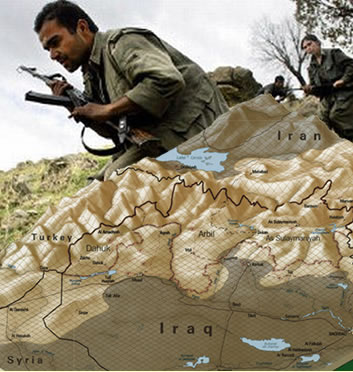Another liquidation by internal forces?
by MEIR JAVEDANFAR in Tel Aviv
20 Jan 2010 22:108 Comments
 [ opinion ] Another political murder rocked Iran this week.
[ opinion ] Another political murder rocked Iran this week.
This time the victim was Vali Haji Gholizadeh, who was shot dead outside his home on Tuesday, January 19, in the city of Khoy, near the Turkish border. He was the chief prosecutor of the city.
The Tehran-based Khabar Online initially blamed "anti-revolutionary forces with relations to foreign governments" for his death. Seyyed Mohammad Ali Mousavi, the head of the judiciary for the Western Azerbaijan province, went a step further and held the Kurdish separatist group PJAK responsible. His evidence was based on intelligence reports. Mehr News Agency, which has close links with the right wing of Iranians politics, declared that the Kurdish separatist group PJAK had in fact "accepted responsibility for the assassination."
The city of Khoy has a sizable Kurdish population. In the early 1980s, its mayor was the then little known bureaucrat by the name of Mahmoud Ahmadinejad, who later on went to become the president of the Islamic Republic. The young Ahmadinejad -- who is Persian -- was viewed suspiciously by the locals, especially as he was related to the Revolutionary Guards, which had violently put down a recent Kurdish uprising.
So tension has always existed in that region. And PJAK has been responsible for a number of bombings and hit-and-run operations against Iranian forces in the past. What could have made them a bigger suspect in this case was the recent hanging of Fasih Yasamani in the city of Khoy, who the government of Iran had accused of being a PJAK activist. Yasamani was executed on January 6. According to the Prosecutor's office in the city of Khoy, Haji Gholizadeh was directly responsible for Yasamani's file. According to the Iranian government (commenting after the execution), Haji Gholizadeh had received death threats from PJAK.
However in a strange twist to the story, PJAK has come out and denied any role in the assassination of Haji Gholizadeh. In an interview with the Persian language Rooz publication, the head of PJAK, Abdol Rahman Haji Ahmadi, stated that "I have no knowledge of who was involved in this act of terror." The same goes for its official newspaper, Rojhe Lat. In a recent article, it stated that "Haji Gholizadeh was assassinated by unidentified persons."
If Haji Gholizadeh had really been responsible for the death of their comrade, had PJAK carried out the hit, it would not have any reason to hide their involvement in his assassination. In fact they would have every reason to announce it as a means of boosting its popularity amongst supporters. They could have also touted it as a victory against the Iranian government and its security forces and to use it as a means of creating deterrence. The separatist group Jundollah did the same in October 2009, when it assassinated several commanders of the Revolutionary Guards.
However PJAK is doing the opposite by denying any responsibility. Perhaps PJAK is concerned about the backlash by the regime. However one also has to ask: Is it possible that this was an inside job?
After the assassination of the Iranian scientist Masoud Ali Mohammadi, some observers, including myself, believed that foreign intelligence agencies were most probably involved. The Iranian government itself placed the blame squarely on the shoulders of foreign intelligence agencies. Other observers remained doubtful. In fact some Iran experts, including Columbia University's Professor Gary Sick, supported the idea that the Iranian government itself was most probably responsible for his murder, as Ali Mohammadi was a Mousavi supporter. His killing was meant to silence and intimidate the Green Movement.
It is also possible that in this case Haji Gholizadeh was also murdered by internal forces. While it's not clear whether he was a member of the opposition, it has been reported that he was involved in the fight against corruption. One cannot rule out the fact that he was possibly working on exposing corruption amongst high ranks of his office or province. It would not have been difficult for senior people to assassinate him and to blame PJAK for it, especially since it would be easy to pass it off as a PJAK hit.
In the current atmosphere of tensions and division within the Iranian regime, assassinating people and blaming it on foreign agents or anti-revolutionary forces can become a popular tool. The alternative of arresting them, putting them on trial and raising the anger of the public would probably be more unattractive and less viable to the regime's interests.
However what Ayatollah Khamenei should note that he can turn into the boy who cried wolf too many times. Meaning in the current confusion, foreign intelligence agencies may actually come and carry out genuine hits. However in such genuine cases, the public may not believe the authorities. And more importantly, members of his own regime, who are concerned about internal liquidations, may actually turn to help foreign intelligence agencies as a means of settling scores with the Supreme Leader and his assassination squads.
After the controversial reelection of Mahmoud Ahmadinejad, one of the trends that can be observed within Khamenei's regime is the increase in chaos within the higher ranks. The factional infighting was made worse last week. In yet another clear indication of the loss of cohesion within the system, Majles was shoved aside by Khamenei and Ahmadinejad in their efforts to place the savings from the subsidies reform package under the government's supervision (instead of the Majles).
In the long term, such acts, which create further isolation and infighting, will come to haunt the regime.
So far, this has not affected the decision-making body for the nuclear program. The day it does will be the day when Khamenei's nuclear dreams will start to slip away from him.
Copyright © 2009 Tehran Bureau






























8 Comments
The regime has routinely assassinated a wide spectrum of individuals for a variety of reasons.From trying to choke off political protests, to rule by intimidation, to providing a pretext for wider arrests. They currently have thousands of political prisoners. This tactic has served them in the past and effectively sabotaged Khatamis presidency and his program of popular reform.The country isn't quite a picture of Chaos that some describe. Any lack of discipline, exists among the regime factions but on the whole the security forces have a tight grip on the majority which happens to be the organised and non-violent Green Movement.No one can say categorically who is behind either murder but in previous political murders the trail led to the leaders doorstep. Likewise many attempted killings.
Pirooz / January 21, 2010 5:46 AMIt looks like the regime of Iran has shut all doors to outside, executing all dissent without even bothering with their famous "Show Trials" which started to gain prominence amongst those raised in hell, since the anti government demonstrations started after their June 2009 fraudulent elections.
I am just bracing myself for lunatics who will post suggestions that it was yet again another "Israeli intelligence job in Iran"/
Siamak In NYC / January 21, 2010 6:52 AMi want to know more than events
roya / January 21, 2010 3:39 PMRoya writes that "she wants to know more than [just] events in Iran".
Majid Patterson / January 21, 2010 7:01 PMWhat more did Roya want to know?. Ascertaining facts by examining "events" is what works best.
The title of this article should be "Whatever happens in Iran it's always the government's fault".
Pretty soon traffic accidents in the streets of Tehran will be blamed on "internal forces" with about as much supporting evidence as this article musters. Since the author cannot possibly portray Haji Gholizadeh as a member of the opposition he falls back on "the fight against corruption". That's the new reality in the IRI, one fights corruption, one gets eliminated by internal forces. For his next performance this author from Tel Aviv will reveal how Montazeri was really killed by the IRGC.
Samuel / January 21, 2010 7:08 PMSamuel wrote:
???For his next performance this author from Tel Aviv will reveal how Montazeri was really killed by the IRGC. ???
I am not from "TelAviv", so I guess that should provide me with more credibility than that of the author's.
Montazeri was not killed by IRGC but he was tortured for over 20 years by the same under house arrest, where he died. (does that count as close enough to murder for you?)
Also when you say, @@@"Pretty soon traffic accidents in the streets of Tehran will be blamed on "internal forces" with about as much supporting evidence as this article musters."@@@
Majid Patterson / January 22, 2010 12:33 AMthere also a heasy set truth in that in any country that enjoys a democratic rule and secularity of thought, the rates of traffic accidents are also very low, which goes to reason as to why the rate of traffic accident fatalitis are so darn high in Iran and on the increase.
A HYPOTHETICAL ATTEMPT TO UNDERSTAND TERRORISTIC ACTS PRESUMABLY COMING FROM THE DEPTH OF THE STATE
The impression one gets as a non-Iranian from the outside of Iran is – beyond a discussion of a desirable distance between religion and state, beyond a look at concrete politicians and institutions – a cocktailmix of following features (the list of the following items is incomplete, insufficient and unsystematic, a sketchy kind of »brainstorming«):
• Communication at the top of state institutions and state organs seems to be rather suggestive and intimately intransparent.
• Thus decision-making processes and structures of responsibility are hard – if at all - to follow, to recognize, to see through, to understand and are scant.
• The (wraithlike) functioning of the respective entourage and the (wraithlike) functioning of the style of the exercise of power of high-ranking politicians and clerics or of politicians and clerics assumed to be high-ranking seems to be obvious,
combined with and supported by favoritism instead of merit and achievement.
• Terroristic loss of reality, due to the frequent application of terror tactics.
• Relinquishment of humane reason in favour of anticipatory and pro-active identification with the presumed will of the respective leading figures seems to be another characteristic feature of Iranian governance.
• Multi-Parallelism of the regular and irregular armed executive state organs with again parallel military, police and ideological functions with multifarious structures of command and responsibility
• This hotchpotch, muddle and mess
of responsibilities
of parallel organizations
of - in addition - the intense desire and impression of some to feel called upon to be active in the interest of a diversely interpreted higher mission
leads to an independent existence of parts of subordinate official institutions and of some subordinate smaller paramilitary and parapolice units that are quite prepared and ready to all kinds of action up to the point of murder, without any particular (written) order given on the part of a higher-ranking responsible figure
• Such a rather chaotic system of organized irresponsibility and initiative-anticipatory obedience alone might be the breeding ground of terroristic (state-induced?) assassinations without any process of detailed planning and without any distinct and pronounced order issued by/from higher-ranking officials responsible for such matters
Publicola / January 22, 2010 12:36 AMMajid Patterson,
"there also a heasy set truth in that in any country that enjoys a democratic rule and secularity of thought, the rates of traffic accidents are also very low, which goes to reason as to why the rate of traffic accident fatalitis are so darn high in Iran and on the increase."
Thank you for making my point for me with your nonsense statement.
Samuel / January 22, 2010 11:10 AM